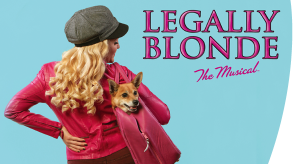Filichia Features: Legally Blonde Goes to College
Filichia Features: Legally Blonde Goes to College
More and more I continue to value Legally Blonde as a significant musical.
Yes, significant. Not just fun: significant, with many positive messages.
Granted, many originated in Amanda Brown’s 2000 novel as well as the 2001 screenplay by Karen McCullah and Kirsten Smith. But bless Heather Hach’s book and the score by Laurence O’Keefe and Nell Benjamin to bring them to us once again.
The songwriters were especially apt for this project, for they’re both graduates of Harvard University, where much of Legally Blonde takes place. Of course when the action starts, Elle Woods is a Malibu chick to whom Harvard only means where her beau Warner Huntington III will study law while she’s his dutiful wife who’ll –
Well, Elle doesn’t tell us what she’ll do. Still, we get the impression that it won’t be anything noteworthy.
Only after Warner dumps her on the grounds that she isn’t the type to be a future senator’s wife is she motivated to get her man back by going to Harvard Law herself. There she’s surprised to see that she has more of a brain than she’d realized. Some of that brain makes her learn that Emmett, the recent law grad who empathizes enough to mentor her, is the man for her and Warner is decidedly not.
In trips to Legally Blonde on Broadway, on tour and in a Nebraska high school production, I’d found many lessons that I felt people would profit from learning. But at Diana Lala’s extraordinary production at the University of Cincinnati College Conservatory of Music last week, I found even more. Here I’ll lump my previous and new thoughts on how Legally Blonde can profit those who see it.
If someone hates you, it's not necessarily a lifetime sentence. Elle’s classmates Vivienne (a convincing Emily Trumble) and Enid (a funky Gina Santare) initially assume that Elle is worthless. Both change their minds as Elle changes her persona. In real life, you too can change the opinions of teachers and co-workers if you apply yourself. That also is true of parents, but:
Believe in yourself even if your parents don’t believe in you. When Elle tells Mom and Dad that she’s applying to Harvard, they pooh-pooh the possibility that she’ll get in, let alone stay in. We may discover things in ourselves that our parents can’t see or imagine.
Treat everyone the same regardless of occupation or social standing. Elle befriends Paulette, her beautician, because Paulette’s a good person, which is good enough for Elle. When she sees that Paulette is attracted to Kyle, Elle helps her to shelve her shyness. Granted, a discussion on world peace is not what gets the two together; a no-holes-barred sexy gambit does. But let’s face it: an unsubtle erotic gesture is preferable to looking, panting, waiting, wishing and hoping.
If your current love dumps you, it may be all for the best. Indeed, a better relationship may well be around the corner – as it is for Elle.
What’s more:
Career advancement can soothe the loss of love. Although Elle is devastated to learn that Warner (the foursquare Ben Biggers) and Vivienne are officially engaged, she rallies when she finds that Professor Callahan has been suitably impressed with her to give her an internship.
Be nice. This show proves that nice guys definitely do not finish last and that niceness is a choice. Not only is Elle nice to Paulette, but Emmett is also nice to Elle. Emmett relates to Elle’s underdog status, but when she shows him for the first time what she’s learned, he has a “By George, I think she’s got it!” song of delight.
Good friends provide good moral support. Sororities are occasionally criticized as trivial, but they’ve resulted in many lifelong friendships.
That Brooke Windham, the fitness guru on trial for murdering her rich older husband, is a sorority sister gives Elle a leg up on her colleagues.
When you make a promise, keep it. Brooke only confides in Elle on the condition that she not blab her secret. Elle is pressured by Callahan and the other students to spill the beans, but she won’t betray Brooke. That Warner sardonically tells her how she’ll advance her career if she reveals what Brooke said makes Vivienne first see that he’s not the man she thought he was.
Knowledge is power. Elle succeeds in winning the trial only partly from what she’s learned in class. She turns out to be right when her instinct tells her that the pool boy who's said to be Brooke’s lover is actually gay. What she also knows is that Brooke's grown stepdaughter would not have showered after a permanent for water ruins such a hair-do cracks the case. Legally Blonde reminds us not to be myopic, but to be aware of the world around us. We have no idea what little piece of information that we’ve picked up along the way will serve us in the future. As long as we’re learning, we're on the right track.
Be gracious in victory. Warner eventually wants to reunite with Elle (although we suspect some of his motivation is that her star is rising far higher than his). Not only does Elle let him down gently -- and with far more feeling than he ever gave her when he dumped her -- but she also willingly admits that he, albeit inadvertently, set the wheels in motion for her to have a rewarding legal career.
The CCM production also can serve to teach those who consider staging Legally Blonde a few lessons, too:
Don’t have enough men? Have one actor portray both guys in Paulette’s life. Although they’re polar opposites – Dewey is a mean, low-class ex-beau and Kyle is happy-go-lucky – people are attracted to the same physical type.
However, height, width and depth were all that Dewey and Kyle had in common when expert actor Jay McGill played both. Truly, theatergoers would have never guessed that they were seeing the same actor if they hadn’t consulted their programs, for McGill made each man that distinctive.

Because Paulette, Dewey, Kyle and Emmett are Boston natives, they must have Boston accents. Madeline Lynch was quite successful in delivering broad “a’s,” especially with words ending in “r.” (Take it from a native Bostonian: here, “water” is “wotta.”) Although Emmett has improved his lot by becoming a lawyer, he mentions that he had to overcome a bad family situation and worked two jobs to get this far. So he should still have the common touch, which Chris Collins-Pisano and Nathanial Irvin, who were double-cast in the role, deftly retained.
Elle was double-cast as well, with Lawson Young and Sarah Bishop each showing a different but equally valid take. Young played a bubble-head who literally shrieks when Emmett gives her a combination shampoo-conditioner instead two separate bottles. Bishop instead took her cue from one of Emmett’s lyrics: “Each time that Warner walks through the door, your IQ goes down to 40.” Thus, Bishop reserved her moments of silliness for scenes when Warner was around and was more together when he wasn’t on the premises.
When Warner breaks up with Elle, have him play the attitude that his parents want this. That could engender sympathy from theatergoers who’ll remember their own parental pressures from their youth.
Although Vivienne tells Elle that an upcoming get-together is a costume party – which it is not – she isn’t otherwise particularly malicious. Have her come across as a woman who’s serious about the law and takes umbrage at anyone who doesn’t match her earnestness.
The actor who played Callahan on Broadway was then 55. Needless to say, Adam Zeph isn’t even half that old, and yet he aged himself splendidly by putting one hand akimbo on his hip and using the other to stab the air with his pen to the point where the air must have been injured. That stance alone gave him the authority that helped age him.
You’ll need gym enthusiasts for your second-act opener in which Brooke and her acolytes jump-rope for many minutes. (My, was Clara Cox and her ensemble impressive here!) This scene replicates a video she made, which means your performers must execute dozens upon dozens of rope-jumps without once getting tangled. That’s a lot to ask, but in the end, you’ll do your performers a favor by getting them into such good shape.
Your Elle will have to be comfortable working with a small dog (Bruiser) while Paulette and Kyle must be at home with a large one (Rufus). Be careful casting here, too; CCM’s students gave their Rufus raves, but had far less good things to say about their Bruiser.
But I have nothing but good things to say about these students. Take the scene where new law student Padamandan, now a deposed prince from a faraway new republic, tells his classmates to call him "Your Majesty." Because Elle arrives late, she misses this directive, so when she tries to be friendly, she thinks nothing of touching Padamandan. And how Erik Hernandez recoiled in horror when Sarah Bishop touched him!
I later asked both if they had come up with that move or if director-choreographer Lala had suggested it. They told me it was their idea. See? Legally Blonde brings out the best in everyone.

You may e-mail Peter at pfilichia@aol.com. Check out his weekly column each Tuesday at www.masterworksbroadway.com and each Friday at www.kritzerland.com. His new book, Strippers, Showgirls, and Sharks – a Very Opinionated History of the Broadway Musicals That Did Not Win the Tony Award is now available at www.amazon.com.


























